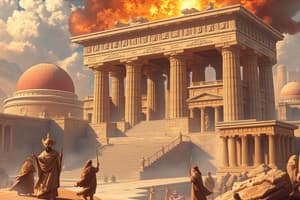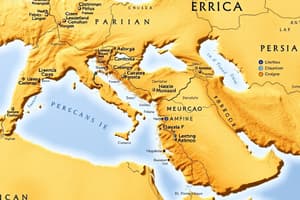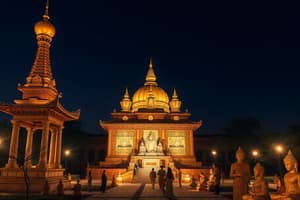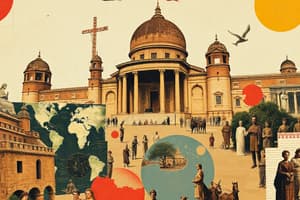Podcast
Questions and Answers
What are shamans?
What are shamans?
Spiritually adept men and women who communicated with the unseen world.
What does Pax Sinica refer to?
What does Pax Sinica refer to?
Chinese peace; under the Han Dynasty, China experienced 400 years of prosperity and stability.
What was the Silk Road?
What was the Silk Road?
Caravan routes connecting China and the Middle East across Central Asia and Iran.
Who were the White Huns?
Who were the White Huns?
What are Germanic tribes known for?
What are Germanic tribes known for?
What is Dhamma?
What is Dhamma?
What is the Achaemenid Persian Empire?
What is the Achaemenid Persian Empire?
Where was the Qin Empire located?
Where was the Qin Empire located?
What distinguishes the Han Empire from the Qin Empire?
What distinguishes the Han Empire from the Qin Empire?
Where was the Maurya Empire located?
Where was the Maurya Empire located?
What characterized the Gupta Empire?
What characterized the Gupta Empire?
What are Phoenicia and its colonies known for?
What are Phoenicia and its colonies known for?
What characterized the Greek city-states and their colonies?
What characterized the Greek city-states and their colonies?
What is the Hellenistic Empire known for?
What is the Hellenistic Empire known for?
Where was the Roman Empire located?
Where was the Roman Empire located?
What was the Zhou Dynasty?
What was the Zhou Dynasty?
What is the Mandate of Heaven?
What is the Mandate of Heaven?
What characterized the Era of Warring States in China?
What characterized the Era of Warring States in China?
What are the Analects?
What are the Analects?
What does Confucianism emphasize?
What does Confucianism emphasize?
What is Legalism?
What is Legalism?
What is Daoism?
What is Daoism?
What significant achievement is Shi Huangdi remembered for?
What significant achievement is Shi Huangdi remembered for?
What is the Han Dynasty known for?
What is the Han Dynasty known for?
What is the significance of the term 'scholar-gentry'?
What is the significance of the term 'scholar-gentry'?
What was the purpose of the Examination System in ancient China?
What was the purpose of the Examination System in ancient China?
What is Chang'an known for?
What is Chang'an known for?
What advancements were made during the Han Dynasty?
What advancements were made during the Han Dynasty?
What is a eunuch in ancient China?
What is a eunuch in ancient China?
What is sati?
What is sati?
What are the Silk Roads?
What are the Silk Roads?
What is an aristocracy?
What is an aristocracy?
What is direct democracy?
What is direct democracy?
What was significant about the Persian Wars?
What was significant about the Persian Wars?
What was Pericles known for?
What was Pericles known for?
What was the outcome of the Peloponnesian War?
What was the outcome of the Peloponnesian War?
What is Hellenism?
What is Hellenism?
Who were the Seleucids?
Who were the Seleucids?
What does 'chattel slavery' refer to?
What does 'chattel slavery' refer to?
What is Jainism?
What is Jainism?
What was the significance of the Royal Road in the Persian Empire?
What was the significance of the Royal Road in the Persian Empire?
What was the purpose of aqueducts in ancient Rome?
What was the purpose of aqueducts in ancient Rome?
Who was Asoka?
Who was Asoka?
What is Zoroastrianism?
What is Zoroastrianism?
Study Notes
Achaemenid Persian Empire
- Located in Southwest Asia; significant ancient empire known for its administration and infrastructure.
- Founded by Cyrus the Great, who extended its territory significantly.
Qin Empire
- An influential empire situated in East Asia.
- Known for legalism and strong centralized rule.
Han Empire
- Expanded from the Qin Empire, established a significant cultural and political legacy in East Asia.
Maurya Empire
- The first centralized empire in South Asia, noted for its military strength and extensive trade connections.
- Founded by Chandragupta Maurya, larger and more prominent than the Gupta Empire.
Gupta Empire
- Flourished in South Asia, recognized for advancements in arts and sciences.
- Followed the Maurya Empire.
Phoenicia and its Colonies
- Key Mediterranean state known for trade and colonization, particularly in lower lands compared to Greece.
Greek City-States
- A collection of city-states in the Mediterranean region, significant for cultural and political achievements.
Hellenistic Empire
- Resulted from the conquests of Alexander the Great, blending various cultures, particularly Greek, Egyptian, and Persian.
Roman Empire
- Dominated the Mediterranean region; known for its extensive infrastructure, legal framework, and spread of Christianity.
Zhou Dynasty
- China's longest dynasty (1050 BCE-400 BCE) known for establishing feudal governance and the concept of the Mandate of Heaven.
Mandate of Heaven
- Ideology developed by the Zhou, justifying the emperor's authority based on divine right.
Era of Warring States
- Period (c. 402-220 BCE) where regional rulers fought for control, leading to the disintegration of the Zhou Dynasty.
Analects
- A collection of Confucius's teachings and thoughts, forming a significant part of Chinese culture and philosophy.
Confucianism
- Philosophy emphasizing ethics, respect for family, and social harmony; devalues merchants and prioritizes public service.
Legalism
- Chinese philosophy asserting that humans are inherently evil, necessitating strict laws and governance.
Daoism
- Philosophy advocating for a life in harmony with nature, promoting simplicity and spontaneity.
Qin Dynasty
- Notable for unifying China and initiating the construction of the Great Wall; ruled using legalistic principles.
Shi Huangdi
- First emperor of China, recognized for ruthless expansion and standardization of various systems across the empire.
Han Dynasty
- Renowned for its advancements in technology, culture, and governance, transitioning from harsh Qin policies to Confucianism.
Han Wudi
- Most significant emperor of the Han, expanded China's territory and culture, enhancing the civil service system.
Scholar-Gentry
- A ruling class in China formed from the intermarriage of landholding aristocracy and government officials.
Examination System
- Implemented by the Han to recruit officials based on merit, available to most males, fostering a bureaucratic class.
Chang'an
- Ancient capital of multiple Chinese dynasties, significant for trade and culture; home to the Terra Cotta Warriors.
Paper
- Invented during the Han Dynasty, representing a major technological advancement for communication and record-keeping.
Eunuchs
- Castrated males used in imperial households, later becoming influential political figures during the Han Dynasty.
Concubine
- A secondary wife with lower social status, often found in polygamous households.
Yellow Turbans
- Daoist revolt in 184 CE that promised a new age through divine intervention but highlighted social unrest in Han China.
Silk Roads
- Extensive trade routes connecting East and West, facilitating commerce and cultural exchange.
Aristocracy
- A form of governance where power is held by hereditary ruling classes.
Democracy
- Political system allowing eligible citizens to participate in governance, either directly or indirectly.
Oligarchy
- Government controlled by a small elite group rather than by a broader population.
Direct Democracy
- Citizens directly participate in decision-making, contrasting with representative systems.
Indirect Democracy
- Citizens elect representatives to make decisions on their behalf.
Athens
- Key city-state in ancient Greece known for its democratic government and cultural achievements.
Sparta
- Militaristic city-state that prioritized discipline and military prowess over artistic pursuits.
Persian Wars
- Series of conflicts in the 5th century BCE between Greek city-states and the Persian Empire, shaping Greek identity.
Pericles
- Prominent Athenian leader during its golden age, known for advancing democracy and arts.
Peloponnesian War
- Conflict between Athens and Sparta (431-404 BCE) that weakened Greece.
Alexander the Great
- Conqueror who spread Greek culture across a vast territory from Asia Minor to the Indus Valley.
Cosmopolitan
- Cultural blending represented in societies, transcending local traditions.
Hellenism/Hellenistic Period
- Cultural integration following Alexander's conquests, combining elements of Greek, Egyptian, and Persian cultures.
Seleucids, Antigonids, Ptolemies
- Successor states following Alexander's empire, each governing diverse regions in the Middle East.
Aryans
- Nomadic group that migrated into northern India around 1500 BCE, influencing the subcontinent's culture.
Caste System
- Hierarchical social classification system in Hindu society.
Brahmins
- Highest social class within the Hindu caste system, comprising priests and scholars.
Untouchables
- Lowest social class in India, performing work considered impure or unclean.
Sati
- A ritual where a widow would self-immolate on her husband's funeral pyre.
Dharma
- Refers to the moral and religious duties an individual must follow in Hinduism and Buddhism.
Karma
- Belief that good or bad actions influence one's future reincarnations.
Reincarnation
- Process of being reborn into new lives until achieving enlightenment.
Chandragupta Maurya
- Founder of the Mauryan Empire, known for unifying Indian territories.
Roman Republic
- Period (509-27 BCE) marked by governance through the Senate and popular assemblies.
Roman Empire
- Extended from 27 BCE to 476 CE, known for its territorial conquests and influential cultural legacy.
Augustus Caesar
- First Roman emperor (27 BCE), credited with establishing Pax Romana, a period of relative peace and stability.
Pax Romana
- 200-year era of prosperity during which arts, architecture, and culture flourished in the Roman Empire.
Christianity
- Monotheistic faith based on Jesus's teachings, becoming central to Roman and later Byzantine culture.
Constantine
- Roman Emperor who legalized Christianity and founded Constantinople, a major cultural center.
Byzantium/Constantinople
- Eastern Roman Empire, known for its cultural achievements and eventual transformation into the Byzantine Empire.
Huns
- Nomadic group that invaded European territories, influencing the migration patterns of other tribes.
Attila the Hun
- Leader of the Hunnic Empire, known for expanding territory and posing threats to Rome.
Germanic Peoples
- Groups that interacted with Rome and contributed to its decline through invasions.
Goths
- Germanic tribes that sacked Rome, leading to the western Roman Empire's collapse.
Animism
- The belief in spiritual essence in natural objects, prevalent in various indigenous religions.
Persepolis
- Ancient ceremonial capital of the Achaemenid Empire, showcasing impressive architectural achievements.
Royar Road
- Major communication and trade route in the Persian Empire, enhancing administration and commerce.
Jainism
- Religion founded by Mahavira emphasizing non-violence and the sanctity of all life.
Chattel Slavery
- A form of slavery where individuals are seen as property, with no personal rights.
Hellenism
- Cultural movement blending Greek ideals with those of conquered societies.
Shamans
- Spiritual leaders believed to communicate with spirits or the unseen world.
Pax Sinica
- Period of stability and prosperity in China during the Han Dynasty.
White Huns
- Nomadic group that invaded northern India, contributing to the decline of the Gupta Empire.
Dhamma
- Buddhist concept referring to the universal laws governing moral and ethical conduct.
Studying That Suits You
Use AI to generate personalized quizzes and flashcards to suit your learning preferences.
Description
Test your knowledge of the major classical empires with these flashcards. Each card highlights key empires like the Achaemenid Persian, Qin, Han, Maurya, and Gupta. Perfect for AP World History students looking to reinforce their understanding of ancient civilizations.




